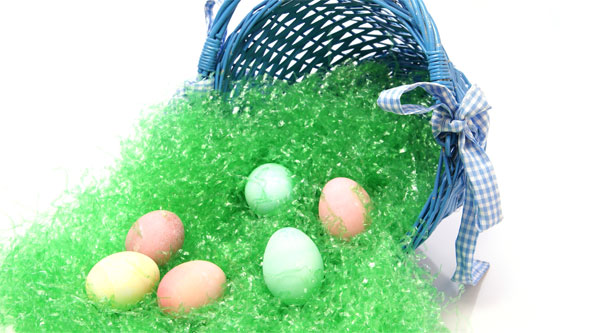A Veterinarian’s Top 5 Easter Hazards for Pets

Spring is here and nothing is more wonderful than the warmer weather, amazing flower blooms, open grass fields, trips to the park, long blissful walks and runs, and Easter! There is just something about Easter that brings a sense of warmth, color, and vibrancy to the air. I love the bright color decorations, the beautiful spring colored décor, and of course all the flowers. As a small animal veterinarian, I know too well how much our beloved pets love the outdoors and holiday festivities. As pet parents, it is so important to be aware of which flowers are safe and which ones can be toxic for your pets, as well as other potential dangers associated with Easter. As the holiday approaches, I wanted to discuss the dangers of Easter for our pets and how we can protect them. Let’s get started:
Easter Lilies:

Lilies from the Lilium or Hemerocallis plant are toxic for cats. Easter lilies belong in this family and are a common decoration during the holiday season and on sale in every store. Easter lilies are a threat to your cat and can be fatal if ingested. All aspects of the flower (petals, stems, leaves, and pollen) have the potential to harm your cat. The toxic effects of Easter lilies result in severe gastrointestinal upset, but if left untreated can result in kidney failure and death. Although Easter lilies are the most common type of lilies during this time of year, other lilies that are also toxic to your pets are tiger lilies, rubrum lilies, Asiatic hybrid lilies, Japanese show lilies, Stargazer lilies, Red lilies, Western lilies, Wood lilies
What are the signs and symptoms of Easter lily Toxicity?
Within 2 to 4 hour of ingestion the most common clinical signs are:
- Vomiting
- Loss of appetite
- Lethargy
- Drooling
- Within 24 to 48 hours if ingestion the most common clinical signs are:
- Anorexia
- Hiding
- Increased drinking and urinating
- Halitosis
- Painful abdomen
- If toxicity progresses to end stage renal failure, decreased or stop urinating
Time is of the essence in treating Easter lily toxicity. If you believe your cat has digested an Easter Lily, please seek veterinary care immediately.
Chocolate:
Chocolate contains two ingredients that are toxic in large quantities: theobromide and caffeine. Different types of chocolate contain different amounts of theobromide and caffeine; therefore, the amount and the type of chocolate your pet eats play a role in its toxic effects. Toxic doses of theobromine (the active ingredient in chocolate that is toxic) are 9 mg per pound of dog for mild signs, and up to 18 mg per pound of dog for severe signs. Milk chocolate contains 44 mg per ounce of theobromine while semisweet chocolate contains 150 mg per ounce. Baking chocolate contains the most at 390 mg per ounce.
What are the clinical signs of chocolate toxicity:
- Diarrhea/vomiting from the high-fat content in the chocolate
- Restlessness
- Hyperactivity
- Muscle twitching, tremors
- Increased drinking and urination
- Excessive panting
- Irritability
- Increased heart rate and abnormal heart rhythm
- In extreme situations, seizures, collapse, and even death can occur.
If your dog or cat has ingested chocolate, you should contact your veterinarian immediately. Many times we can assess on the phone how much they ingested, and assure you it is not enough to cause a toxicity. However, if your pup did ingest chocolate, we can initiate treatment immediately by inducing vomiting, administering IV fluids, and monitoring during hospitalization.
Xylitol:
Xylitol is an artificial sweetener used in many sugar-free gums, candies, baked goods, and mouth washes. When your pet ingests xylitol or xylitol containing products, it causes a rapid release of the hormone insulin, resulting in a sudden decrease in the blood glucose.
What are the clinical signs of xylitol toxicity:
- Lethargy
- Vomiting
- Loss of coordination
- Collapse
- Seizures
- Severe cases, liver failure
Be aware of any candies or foods that may contain xylitol and keep them far out of the reach of your pet. If your dog or cat has ingested xylitol, you should contact your veterinarian immediately.
Easter Decorations:

Easter Basket Fillers- plastic Easter grass, plastic eggs, foil wrapping, and toys are very enticing for pets. These decorations, if ingested in large quantities, can result in serious health problems such as mechanical obstruction, gastroenteritis (upset belly), and pancreatitis. I have performed emergency surgeries on many pets that have ingested these materials. Make sure to keep the Easter baskets and decorations far out of reach of your pets.
Fatty Foods
It is the holiday and hosting parties with friends and family are always a big part of the festivities. Be careful with allowing your pet to eat the Easter delights. This is a common time of year where I evaluate many fur babies at my animal hospital for an upset belly. Fatty foods that are often served during Easter festivities, such as ham and lamb, can cause problems ranging from stomach upset to more serious illnesses such as pancreatitis, resulting in pain, vomiting, and dehydration.
There is no need for your pets to feel left out. Let them indulge on Easter! I tell all my pet parents to have treats and food easily accessible during the holiday festivities and spoil your pets rotten. I absolutely love and trust Wellness CORE and it is what feed my own dog. Wellness CORE is a balanced diet that is grain free, contains all the highest quality ingredients, added supplements (omega 3 fatty acids, and glucosamine), and higher protein for lean body mass and muscle tone.
Spring is the best time of year and Easter is such a wonderful holiday. I hope this article is helpful in informing my pet parents of the dangers of pet Easter toxicities lilies and helps you to enjoy the holiday to its fullest. As always, your pets overall health and well being is my top priority. Knowledge of the dangers of Easter hazards and prevention is key to keeping your pet safe. Happy Easter!




